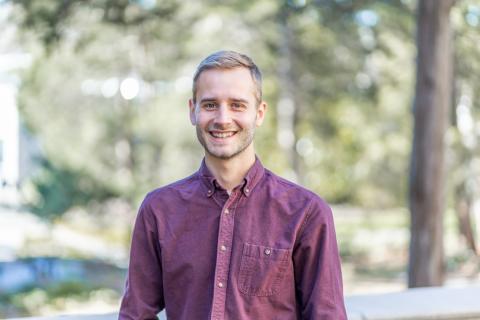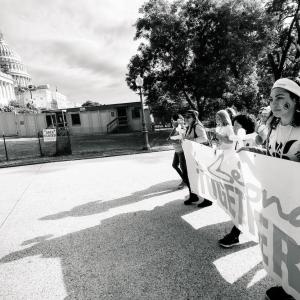
Avery Davis Lamb is an activist, ecologist, and public theologian working at the intersection of Christianity and environmental justice. He is the co-executive director of Creation Justice Ministries, whose mission is to educate, equip and mobilize Christians to protect, restore, and rightly share God's creation.
Avery has a background in both ecological research and faith-based environmental organizing, studying ecology in various ecosystems and organizing faith communities across the country in support of action on environmental justice. He serves on the board for The Center for Spirituality in Nature and is a Fellow with the Re:Generate Program at Wake Forest Divinity School and the Foundations of Christian Leadership Program at Duke Divinity School.
Posts By This Author
'Religious Freedom Has Never Been Unfettered'
“Religious freedom has never been unfettered. It has always been the case that you are free to exercise your religion — as long as it’s not hurting anyone else,” Bishop Gene Robinson said.
Happy Thanksgiving? End the Violence at Standing Rock

Image via Peg Hunter/Flickr
In the same week as a holiday that celebrates gratitude, inclusivity, and cultivation of common ground, militarized police and political powers chose instead to continue a 600-year American legacy: destruction of land, sterilization of culture, and denial of the full humanity of indigenous people.
The Patron Saint of Environmental Justice?

Image via Paolo Gallo/Shutterstock.com
Francis’ life shows us that were he with us today, he would likely be less concerned with the blessings of pets and more concerned with the racism and classism of our environmental problems.
Joe Biden Crashes College Party With This Important Message
The two team up to take on rape culture and send a strong message about bystander intervention. Vice President Biden reminds us of the statistics: one-in-five women and one-in-sixteen men assaulted by the time they leave college. But he’s not the only one qualified to talk about sexual assault. Biden assures us" “Everyone in this room is qualified. It’s on all of us to change the culture and prevent sexual assault.”
1 Year Later, '100 Miles' March Takes on Rising Anti-Immigrant Sentiment

Image via Steve Pavey/Hope in Focus.
It has been a year since immigrant mothers made the impressive pilgrimage on foot from an immigrant detention center in Pennsylvania to the political seat of power in Washington, D.C. On Sept. 16, the women of last year’s 100 Women 100 Miles pilgrimage returned to the steps of the Supreme Court — singing, chanting, and praying for justice and mercy in the immigration system. Then, as part of an event organized by We Belong Together and The National Domestic Workers Alliance, they retraced a portion of their steps — a scaled-down anniversary pilgrimage, from the Supreme Court to the White House.
Kissing Sexist, Racist Christianity Goodbye

Image via Mikkel Bigandt/Shutterstock.com
Brock Turner’s case is not an isolated incident of a poor judge or a flawed judicial system. The roots of Brock Turner’s three month sentence goes deeper than the courtroom in Santa Clara, Calif. These roots extend deeply into the soil of power, privilege, and patriarchy — systems actively formed, in part, by misdirected Christianity. Eldredge, Harris, Driscoll, and Piper are only four recent examples of a harmful narrative that has been preached for centuries.
Yes, Prayer Can Change Things

Image via nito/Shutterstock.com
We are at a moment when prayer is often viewed as a cop-out for policy action. The distaste for prayer in our political arena was most visible in the New York Daily News cover story “God Isn’t Fixing This,” following the San Bernardino, Calif., shooting in December. The cover story called the politicians’ prayer tweets “meaningless platitudes” in the face of their inaction.
In light of this frustration with the political posturing of prayer, how might we see the World Day of Prayer for the Care of Creation as a meaningful action toward climate justice?
Standing With the Standing Rock Sioux
Unlike the Keystone pipeline protests, which garnered headlines around the world, the Standing Rock protests have largely gone ignored – silenced, in McKibben’s words, as a result of “the endless history of unfairness” experienced by Native Americans.


